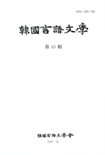- 영문명
- Reconsideration on Interrogative Auxiliary Particle in the Middle Korean
- 발행기관
- 한국언어문학회
- 저자명
- 양영희(Yang younghee)
- 간행물 정보
- 『한국언어문학』韓國言語文學 第63輯, 53~78쪽, 전체 26쪽
- 주제분류
- 어문학 > 한국어와문학
- 파일형태
- 발행일자
- 2007.12.30

국문 초록
영문 초록
This paper suggests that ‘ga/go’ of ‘noun+ga/go’ should be known as conclusive ending with following reasons. This ‘ga/go’ form is considered as ‘additional particle’ and is also considered as ‘interrogative auxiliary particle’ or ‘interrogative postposition’. On the former case, ‘da/ga/go’ of ‘nda, nga, ngo’ form as well as ‘ga/go’ are considered as ‘additional particle’ so that ‘da’ in assertive sentence is considered as ‘conclusive ending’ and ‘da’ in interrogative sentence is considered as ‘additional particle’. With this view, it is difficult to make connection between conclusive endings. In addition, additional particle which is a kind of focus postposition should be given function of interrogative mood and politeness mood. This burden is applied on both situations of considering them as auxiliary particle and postposition.
This study proposes to establish the above as conclusive ending. If the attention placed on the role of ‘ga/go’ in the sentence rather than the preceding of ‘ga/go’ whether it is independent form or not, then it should be interpreted that the listener who is the lower class than the speaker is requested to explain or answer something. This, therefore, should be understood as conclusive ending not postposition because not postposition but ending is in charge of the function of politeness mood and interrogative mood. (Chonnam Univercity)
This study proposes to establish the above as conclusive ending. If the attention placed on the role of ‘ga/go’ in the sentence rather than the preceding of ‘ga/go’ whether it is independent form or not, then it should be interpreted that the listener who is the lower class than the speaker is requested to explain or answer something. This, therefore, should be understood as conclusive ending not postposition because not postposition but ending is in charge of the function of politeness mood and interrogative mood. (Chonnam Univercity)
목차
1. 머리말
2. 의문보조사의 새로운 문법 범주 설정
3. 맺음말
〈참고문헌〉
[Abstract]
2. 의문보조사의 새로운 문법 범주 설정
3. 맺음말
〈참고문헌〉
[Abstract]
키워드
해당간행물 수록 논문
참고문헌
최근 이용한 논문
교보eBook 첫 방문을 환영 합니다!

신규가입 혜택 지급이 완료 되었습니다.
바로 사용 가능한 교보e캐시 1,000원 (유효기간 7일)
지금 바로 교보eBook의 다양한 콘텐츠를 이용해 보세요!


